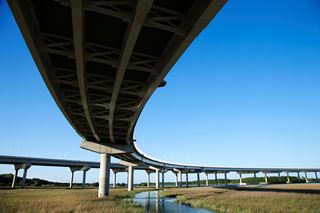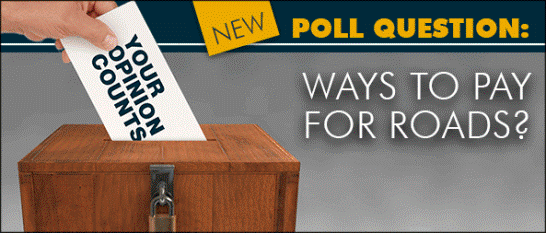 Transportation infrastructure funding, reverse credit transfer to the state’s accredited two-year colleges and expansion of the state’s civil rights law are among the Indiana Chamber of Commerce’s top priorities for the 2016 session.
Transportation infrastructure funding, reverse credit transfer to the state’s accredited two-year colleges and expansion of the state’s civil rights law are among the Indiana Chamber of Commerce’s top priorities for the 2016 session.
These objectives were announced at the organization’s annual Central Indiana Legislative Preview in Indianapolis today.
The Indiana Chamber proposes an array of strategies to establish a sustainable funding stream for the state’s roads, highways and bridges. These include dedicating more of the state’s sales tax on fuel purchases to infrastructure, increasing and indexing fuel excise taxes and implementing fees on alternative fuel vehicles.
“Indiana benefited greatly from the Major Moves program that accelerated our timeline and funded $4 billion worth of projects over the last decade. But those dollars are spent or allocated. It’s time to move forward with the next generation of resources to drive our economy by moving people and products throughout our state and beyond,” says Indiana Chamber President and CEO Kevin Brinegar.
“Legislative action is needed in the coming session to address glaring needs and begin implementing long-term strategies to allow our state to live up to its ‘Crossroads of America’ designation.”
Brinegar concludes that the good news is that legislative leaders, the Governor and others are on the same page about the need; the challenge will be how to get there.
Higher education is also a focal point for the Indiana Chamber. One specific proposal the organization will be pushing for is a method to allow for more students to turn their existing college credits into a two-year degree. This would be accomplished by allowing specific credits earned at state-supported colleges and universities to be transferrable to Indiana’s accredited two-year schools, such as Ivy Tech and Vincennes. Credit is already generally transferrable from the two-year schools to their four-year counterparts.
“This would give students more opportunity for post-secondary attainment and then obviously help with employment,” Brinegar offers. “Specifically, it would help fill the gap for those individuals who first went to a four-year school but for whatever reason couldn’t continue. This would be a viable path for them to turn their efforts into a two-year degree and become more attractive to employers.”
Earlier this month, the Indiana Chamber announced its support for expanding the state’s civil rights law to include protection for sexual orientation and gender identity, with Brinegar noting:
“The time has come for Indiana to expand protections against potential discrimination. This action will increase the state’s future business competitiveness in the recruitment, attraction and retention of talent, as well as enhance respect for all employers and employees. We encourage our state leaders to work together to take this next critical step.”
Another initiative the organization will again pursue is a work sharing program, which will allow employers to maintain a skilled stable workforce during temporary downturns and enable employees to keep their jobs but with reduced hours and salary (which is partially offset by unemployment insurance). This program has enjoyed support on both sides of the aisle the last few years, but has yet to cross the finish line.
“There is no negative impact on the state’s unemployment insurance fund. Instead of paying full benefits to a smaller group of recipients, a larger group of employees will receive limited benefits – but most importantly remain on the job,” Brinegar explains. “There is no reason not to enact a work share program to help meet future employee and employer needs. They deserve that option.”
The other two legislative priorities for the Indiana Chamber are maintaining a fair and equitable system for the state’s commercial property assessment and appeal procedures (in the face of recent “big box” retail stores’ appeals and reaction to that); and expanding publicly-funded preschool from the pilot program to statewide so more children are prepared to enter kindergarten.
A complete rundown of the Indiana Chamber’s 2016 key legislative initiatives (top priorities and additional areas of focus) is available at www.indianachamber.com/priorities.
Also at the legislative preview event, four state legislators were honored as Indiana Chamber Small Business Champions “for their hard work and dedication to improving Indiana’s small business climate.” This award is based on voting and advocacy during the 2015 legislative session.
The 2015 Small Business Champions are: Sen. Rodric Bray from Martinsville, District #37; Sen. Carlin Yoder from Middlebury, District #12; Rep. David Ober from Albion, District #82; and Rep. John Price from Greenwood, District #47.
Recap of the Indiana Chamber’s Top 6 legislative priorities:
- Support an array of strategies to establish a sustainable funding stream for the state’s roads, highways and bridges
- Support specific credit transfer from Indiana’s four-year, state-supported institutions to the state’s accredited two-year colleges
- Support expanding the state’s civil rights law to include protection for sexual orientation and gender identity
- Support a work sharing program that will allow employers to maintain a skilled stable workforce during temporary downturns
- Support maintaining a fair and equitable system for the state’s commercial property assessment and appeal procedures
- Support the development of publicly-funded preschool initiatives statewide
 Highways and bridges are easily taken for granted. They only come to mind for most of us when something goes wrong: A car hits a large pothole or there is an inconvenient road closure. But if you look around, the inevitable aging of our infrastructure system is happening.
Highways and bridges are easily taken for granted. They only come to mind for most of us when something goes wrong: A car hits a large pothole or there is an inconvenient road closure. But if you look around, the inevitable aging of our infrastructure system is happening.

 Transportation infrastructure funding, reverse credit transfer to the state’s accredited two-year colleges and expansion of the state’s civil rights law are among the Indiana Chamber of Commerce’s top priorities for the 2016 session.
Transportation infrastructure funding, reverse credit transfer to the state’s accredited two-year colleges and expansion of the state’s civil rights law are among the Indiana Chamber of Commerce’s top priorities for the 2016 session. We’ve got an infrastructure funding problem in our state and country. This likely isn’t one of the solutions currently being considered. But then think of all the technological advances we enjoy today that were once just a dream.
We’ve got an infrastructure funding problem in our state and country. This likely isn’t one of the solutions currently being considered. But then think of all the technological advances we enjoy today that were once just a dream. The U.S. Department of Transportation (DOT) is currently seeking comments on the Primary Freight Network and National Freight Network designations. The Indiana Chamber believes that I-69 should be included as part of the National Freight Network and is asking DOT to support this effort.
The U.S. Department of Transportation (DOT) is currently seeking comments on the Primary Freight Network and National Freight Network designations. The Indiana Chamber believes that I-69 should be included as part of the National Freight Network and is asking DOT to support this effort. Today's venture back in the annals features a 1959 collection of research studies, titled "Spotlight on Legislative Issues," which was prepared by the Chamber and provided to state legislators of the day.
Today's venture back in the annals features a 1959 collection of research studies, titled "Spotlight on Legislative Issues," which was prepared by the Chamber and provided to state legislators of the day.
 Properly funding Indiana's highway and road system is critical toward promoting a healthy infrastructure — a vital element of our state's business climate. There are a variety of related bills in the Indiana Legislature this session, though little clarity remains on how to pay for future needs. Advocates will gather at the Statehouse on February 19 to emphasize the importance of the issue . Experts will be on hand to offer talking points, answer questions and lead the effort. Details are as follows:
Properly funding Indiana's highway and road system is critical toward promoting a healthy infrastructure — a vital element of our state's business climate. There are a variety of related bills in the Indiana Legislature this session, though little clarity remains on how to pay for future needs. Advocates will gather at the Statehouse on February 19 to emphasize the importance of the issue . Experts will be on hand to offer talking points, answer questions and lead the effort. Details are as follows: